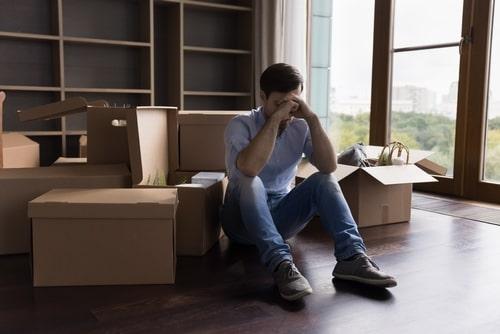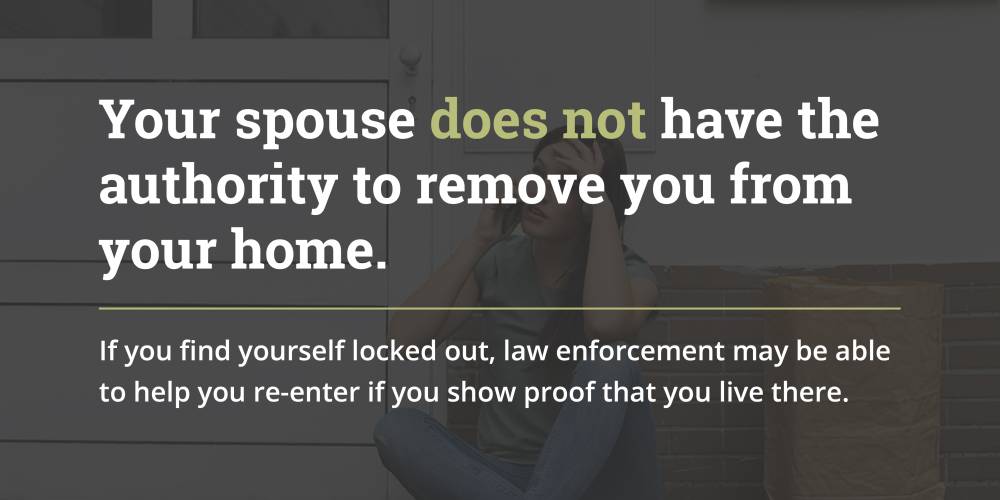630-462-9500
After Hour New Client Telephone Number 630-690-6077
1776 S. Naperville Road, Building B, Suite 202,
Wheaton, IL 60189
Can My Spouse Kick Me Out of the House During a Divorce in Illinois?
 With any divorce comes a great deal of uncertainty. And with uncertainty comes stress. Among your most intense worries may be the uncertainty about where you will live in the future or whether your spouse is legally able to kick you out of the house while your divorce is ongoing.
With any divorce comes a great deal of uncertainty. And with uncertainty comes stress. Among your most intense worries may be the uncertainty about where you will live in the future or whether your spouse is legally able to kick you out of the house while your divorce is ongoing.
If you have concerns regarding your living situation or if your spouse has already begun threatening to kick you out, discuss these concerns with a qualified Wheaton, IL divorce attorney. Your attorney is trained in Illinois divorce law and can ensure that you are aware of your rights and make certain those rights are protected.
At The Stogsdill Law Firm, P.C., we take pride in our stellar reputation in the Illinois legal community. As one of the most prestigious law firms in Wheaton and surrounding DuPage County communities, we have access to the resources that can be the difference maker in a case.
Understanding Marital Property Rights in an Illinois Divorce
Neither party in an Illinois divorce is required to leave the family home while divorce proceedings are underway. Furthermore, as a state that follows equitable distribution of marital property (per 750 ILCS 5/503), both spouses generally have the legal right to the marital residence, regardless of whose name is on the title or lease.
This often surprises people, especially if one spouse purchased the house before the marriage or inherited it individually. Even if the property is considered non-marital, the other spouse may still have a right to live there during the divorce if it has been used as the family home. For example, if a husband purchased a home before marriage, but his wife and children have lived there for the past decade, the court will not simply order her out because her name is not on the deed.
The principle behind this rule is stability. Courts understand that forcing one spouse to move out before the divorce is resolved can create unnecessary hardship and disrupt children’s lives.
Legal Protections Against Forced Evictions During Divorce
Your spouse does not have the authority to remove you from the home on their own. If they try to change the locks, physically move your belongings, or shut off utilities to drive you out, this may be considered an illegal "self-help" eviction. Illinois law requires a court order for eviction, and spouses are not allowed to take matters into their own hands.
If you find yourself locked out of your home, you can call law enforcement and may be able to re-enter with proof that you live there. You should also contact your attorney immediately to address the violation in court. A judge can issue temporary orders to prevent your spouse from interfering with your access to the home.
Imagine this common scenario: One spouse works late, and the other changes the locks during the day to try to force the first spouse to move out before the divorce is finalized. But the locked-out spouse still has a right to enter the marital home, and the court may take the offending spouse’s actions into account when making property or custody decisions later.
When Can a Judge Order One Spouse to Leave the Home?
Although spouses cannot force each other out, a judge can. Courts may grant one spouse temporary exclusive possession of the marital home during divorce proceedings, but only under specific circumstances.
Illinois law allows for this when the court finds that living together is not in the best interests of the family or poses a risk to safety. Examples include:
-
Domestic violence: Under the Illinois Domestic Violence Act (750 ILCS 60), a judge can issue an order of protection requiring an abusive spouse to leave the home.
-
Child welfare concerns: If the court believes conflict or unsafe conditions are harming the children, it may order one parent out to preserve stability.
-
Extreme conflict: In rare cases where constant fighting makes cohabitation impossible, the court may intervene to reduce hostility.
The important point is that removal can only happen through the court system, not through one spouse acting unilaterally.
Temporary Exclusive Possession of the Marital Home
Exclusive possession means that one spouse is granted the legal right to live in the marital residence, and the other must leave. These orders are usually temporary, lasting until the divorce is finalized or until further order of the court.
Judges consider several factors in deciding whether to grant exclusive possession, including the presence of children, each spouse’s financial ability to secure alternate housing, and whether living together would jeopardize safety or well-being.
For example, a judge may grant exclusive possession to a mother who is the children’s primary caregiver if moving them elsewhere would cause serious disruption. Conversely, if both spouses can remain civil while living under the same roof, the court may decline to order either one out.
How Living Arrangements Affect Divorce Negotiations
In many divorces, spouses continue living together in the marital home until the case is resolved. This can be uncomfortable, but for some families it makes financial sense. Mortgages, rent, and utility costs may be too high for both parties to maintain separate residences during the divorce.
Still, cohabitation during divorce often intensifies conflict. Daily arguments, power struggles over shared space, and disputes about parenting schedules are common. Courts prefer that parents shield children from these conflicts, and the stress of constant fighting can negatively influence custody decisions.
Your attorney can request temporary court orders to establish who pays household bills, how shared space is used, and how parenting responsibilities are divided while you and your spouse remain under the same roof.

What If Safety Becomes an Issue During Divorce?
Most disputes about staying in the marital home are ordinary disagreements about money and comfort. But in some cases, the issue involves serious safety concerns. If domestic violence or threats occur, you should take immediate action.
Orders of protection are available under Illinois law and can require an abusive spouse to leave the home immediately. Courts take these matters very seriously, especially when children are involved. Even if abuse cannot be proven to the criminal standard, a civil court can still grant protective relief if there is evidence of danger.
If you or your children are at risk, your lawyer can help you file for an emergency order of protection, which can be issued the same day and last until a hearing is held.
Steps to Take if Your Spouse Threatens to Kick You Out During Divorce
If your spouse threatens to kick you out of the marital home, you should:
-
Document any threats or attempts to change locks or remove you from the residence.
-
Avoid escalating confrontations that could be used against you in court.
-
Contact your attorney right away to discuss legal remedies, such as requesting temporary orders.
-
In cases of violence or threats of violence, call law enforcement and seek an order of protection.
Having clear records and legal support ensures you are not left vulnerable during this difficult time.
Hire a DuPage County, IL Divorce Lawyer for a Private Case Evaluation
There is no question that navigating property rights and living arrangements in a divorce is not an easy task, especially when emotions are running high. That is why hiring a lawyer is so important. Not only will an attorney explain your rights, but they will ensure those rights are upheld as they advocate for your best interests during the process.
At The Stogsdill Law Firm, P.C., our qualified Wheaton, IL divorce attorneys have experience handling both ordinary disputes and high-conflict situations. Whether your case involves disagreements about staying in the marital home or urgent safety concerns, we are ready to act quickly and effectively. Call 630-462-9500 to schedule a private case evaluation today and get the help you need and deserve.




















